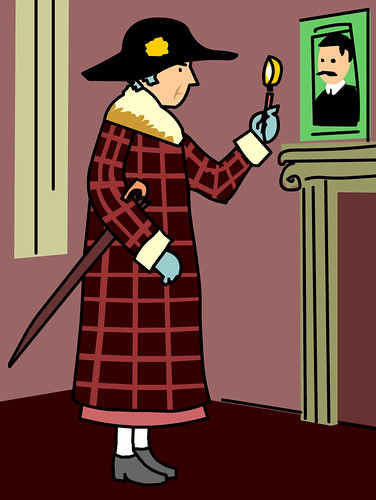Muahahahaaaahh.
Ahem.
This chapter covers a variety of concepts, from anger to synchronicity to why people would prefer to think there is no God (“Most of us are a lot more comfortable feeling we’re not being watched too closely”).
“Anger is our friend. Not a nice friend. Not a gentle friend. But a very, very loyal friend. It will always tell us when we have been betrayed. It will always tell us when we have betrayed ourselves.”
This idea of anger as a marker of transgression or trespass also comes up in another book I have been reading of late: Boundaries – which is an example of synchronicity.
I will cheerfully admit that I did most of the work for this chapter fairly early on in the month (i.e. half way through it) and my mind has been elsewhere since.
I was surprised by some of the things which unburied themselves in the “Detective Work”.
“My favourite musical instrument is” the low whistle – which I have never held, let alone learned to play, although I once discovered someone in New Zealand who makes them.
“If I wasn’t so stingy with my artist I’d” buy her (her? my internal artist, like many children, doesn’t seem strongly gendered) some really flash stationery. Maybe some ink-bottles.
“If it didn’t sound so crazy, I’d” write a supermarket musical. What do I have to fear from crazy? One day I’ll do it.
I am haunted by the fear that if I commit to this writing life, if I let the dreamer loose, I won’t be able to keep making myself go back to work.
With the regular exercises, further surprises ensued.
I was supposed to describe 5 traits I like in myself as a child. I came up with one: my ability to pun. (Whether anyone else liked that in me as a child, I know not.)
That was a bit depressing, but I did better in the field of childhood accomplishments (e.g. started reading Agatha Christie at 6 1/2).
Habits! If only changing habits was as easy for me as it is for nuns. (Yes, that’s what I was like as a child.) Wasting time online, procrastinating, feeling guilty instead of getting on with things…
Physical habits are relatively easy to break, I think. It’s the ones in your mind that most closely ensnare you.
The lists of people I admire and want to meet (dead or alive) were confusing: great writers such as Chesterton, Lewis and Stoppard; and a rather strange mix of people including the Pimpernels (Scarlet and Tartan), Francis, Fanny Crosby and Edith Cavell.
If anyone can tell me what the common thread is there, I shall be much obliged to you.
In other news, I spent the entire long weekend (four days in New Zealand, Lord be praised!) in Not Writing. I meant to write, but I meant to do many other things, and it turns out four days is only four days long.
One thing which I did mean to do (and did) is create something for my Artist’s Date. It still needs a few finishing touches, but here’s a clue:







